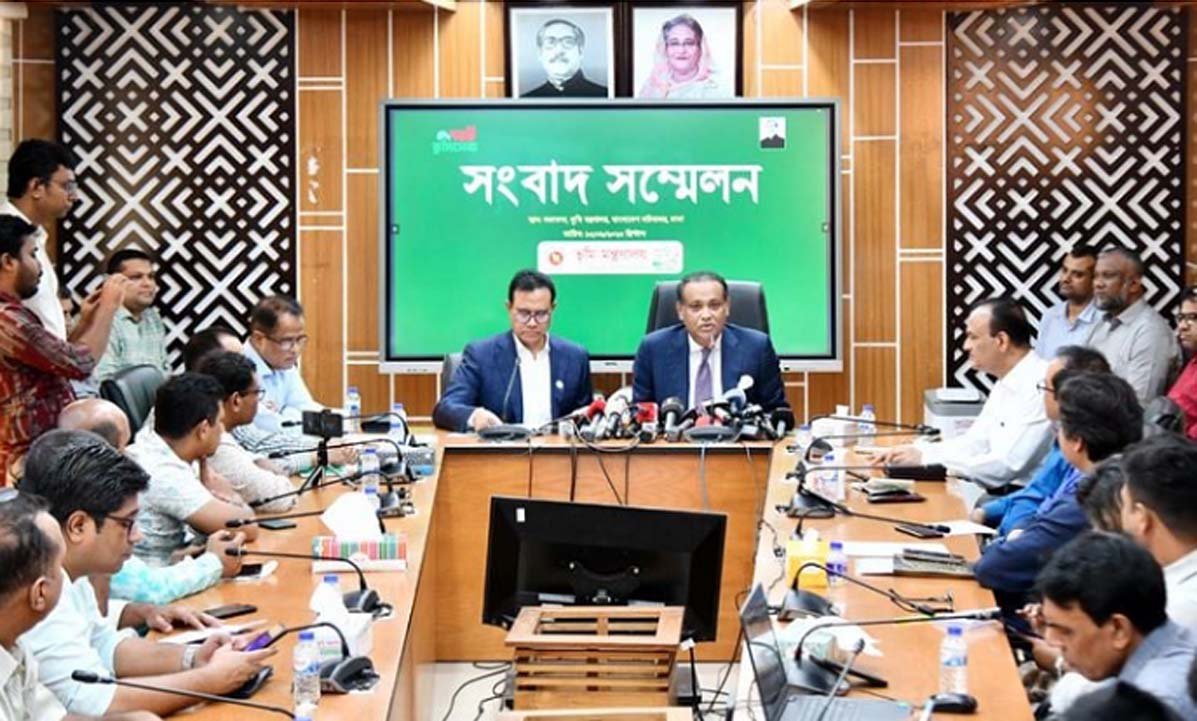
Land Minister Saifuzzaman Chowdhury said an individual cannot own more than 60 bighas of agricultural land as per the Land Reform Act-2023.
“If inherited land exceeds 60 bighas, the heir can choose to retain 60 bighas of land, while the remaining land will become government-owned (Khas) and compensation will be provided according to government regulations,” he made the comments at a press conference held at his ministry, an official release said.
The press conference was held as the three land-related bills passed by the Jatiya Sangsad yesterday (Tuesday).
The land minister said if someone unlawfully acquires additional land in their name or through a pseudo name despite already owning 60 bighas, the excess land will be confiscated without government compensation.
He said the primary objective of the Land Crimes Prevention and Redress Act is to deter individuals from engaging in land-related crimes.
He said that this law has been made possible due to the dynamic leadership and courage of Prime Minister Sheikh Hasina.
The three land bills recently passed by parliament include the ‘Land Crime Prevention and Redress Act, 2023,’ the ‘Land Reform Act, 2023,’ and the ‘Balumohal and Soil Management (Amendment) Act, 2023’ (related to sand quarrying). These bills, once granted assent by the President, will become law and be published in the Gazette for public information as Acts of Parliament.
Saifuzzaman said “The process of enacting the law was complex and sensitive. Extensive consultations were held with stakeholders, both at the individual and organizational levels, during the drafting phase.” Thanks to the dedication of all involved in the process, the law has been presented as a gift to the people of the country ahead of schedule, he said.
He added that this is a relatively new law, and any necessary corrections will be made based on its implementation in the field level.
Regarding the Land Crime Prevention and Redress Act, the minister explained that land-related offenses have been categorized into eight primary categories, the minister said.
The categories include ‘Land Fraud,’ ‘Land Forgery,’ ‘Illegal Occupancy,’ ‘Non-transfer of possession of land sold to the buyer,’ ‘Damage to boundaries or land,’ ‘Illegal occupation, entry, or construction on Government, Semi-Government, Permanent Institution, or Public Use Land,’ ‘Illegal encroachment, change of class, of land in the interest of Government, Semi-Government, Autonomous Institutions, or Public Use Land,’ and ‘Top-soil cutting and filling.’
Regarding the Land Crime Prevention and Redress Act, the minister said that trials for land fraud-related crimes and land forgery-related crimes should take place in the court of a first-class judicial magistrate or a metropolitan magistrate. These trials must be completed within 180 working days.
Apart from crimes related to land fraud, which also include orders for the restoration of possession to persons who have been illegally dispossessed and cases of repeated offenses mentioned in the Act, other offenses specified in the Act may be tried through the Mobile Court, subject to a schedule list, he added.
Saifuzzaman also said crimes related to land fraud and land forgery are considered non-bailable, while other offenses are bailable and those can be settled through compromise.
“The Land Secretary informed that crimes related to land fraud and land forgery are punishable by up to 7 years of imprisonment and fines, while other offenses can lead to up to 2 years of imprisonment and fines. If the same offense is repeated, the law prescribes double punishment,” he added.
It’s worth noting that significant aspects of the Land Crime Prevention and Remedial Act include the recovery of possession, provision of compensation, protection of witnesses, land database, and the assistance of law enforcement agencies, the minister added.
Additionally, if any difficulties arise in implementing any provision of this Act due to ambiguity, the government may take necessary measures to address such issues in accordance with other provisions of the Act, he said.
 Weekly Bangla Mirror | Bangla Mirror, Bangladeshi news in UK, bangla mirror news
Weekly Bangla Mirror | Bangla Mirror, Bangladeshi news in UK, bangla mirror news







